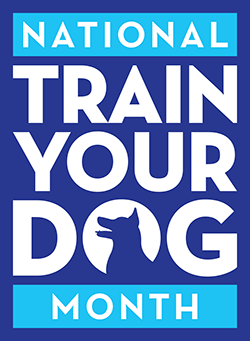January is National Train Your Dog Month, sponsored by the Association of Professional Dog Trainers (APDT).

The association has a website dedicated to the event and filled with free resources to help you train and care for your dog. On the home page, you’ll find links to several episodes of Speak!, ADPT’s podcast for pet owners. Below the podcast section, you’ll find links to videos offering a range of training tips as well as more general advice on dog care.
The Tips tab takes you to a page linking to 11 informative training-related handouts—all downloadable as free PDFs.
The Resources link takes you to a collection of blog posts on the Association of Professional Dog Trainers’ main website. The posts are of interest to trainers as well as pet owners. To narrow your selection, choose the most relevant category listed at the top of the page.
Training the LIMA Way
Many leading professional dog trainers adhere to Least Intrusive, Minimally Aversive —LIMA—techniques.
According to an APDT position statement on LIMA, “LIMA requires that trainers and behavior consultants use the ‘least intrusive, minimally aversive technique likely to succeed in achieving a training [or behavior change] objective with minimal risk of producing adverse side effects.’”
In elaborating further, the association maintained “there are no training or behavior cases which justify the use of intentional aversive punishment-based interventions in any form of training ranging from general obedience and tricks to dealing with severe behavior problems. This is in agreement with the American Veterinary Society for Animal Behavior and available literature.
“Trainers who use aversive tools such as choke collars, prong collars, shock collars (including ‘stim-collars’ and ‘e-collars’), bonkers, shaker-cans, citronella spray, water spray, leash-pop/leash-corrections (with any type of collar/harness), yelling, or any other technique designed to cause fear, pain, or startle in the dog are not practicing LIMA as described and used within APDT.
“Trainers who are unable to train a specific behavior or to a specific outcome without resorting to aversive techniques should use resources such as the APDT community pages to contact and work with trainers who do.”
As of 2021, APDT has required its members to certify they will follow LIMA principles. The Brownsburg Animal Clinic team wholeheartedly supports this approach to training.
Whether you train at home on your own or choose to work with a professional trainer or behavior consultant individually or in a class, we recommend you learn to train the LIMA way. Before hiring a trainer or signing up for a class, ask if they use any of the aversive “old school” tools and techniques named above and if they do, keep looking until you find a more progressive, enlightened professional.
Learn More About LIMA
For an overview of LIMA and the related Humane Hierarchy—a system ranking training methods in order from least to most intrusive—see “LIMA Dog Training Principles: What You Need to Know.”
See also “Understanding LIMA Dog Training: A Humane and Effective Approach” published by the Ohio-based dog training facility, Canine Academy.
Read “The Humane Hierarchy of Behavior Modification Explained” and “The Humane Hierarchy in Training and Behavior Modification” for more technical explanations of these training concepts.
Let Us Help!
As always, our veterinarians are happy to answer questions and offer guidance about behavior problems and anxiety-related issues your dog may be experiencing.
If you need more specialized help, we may refer you to Veterinary Behavior of Indiana.
With a sound, positive approach to training your dog, you can vastly improve your dog’s and your own quality of life, build a closer bond and have fun while you’re doing it! We wish you success!

